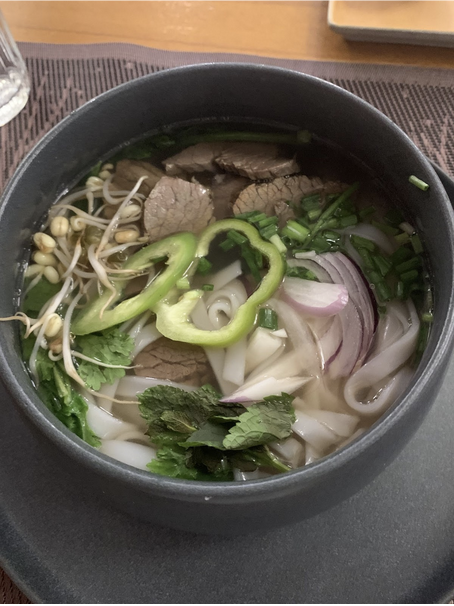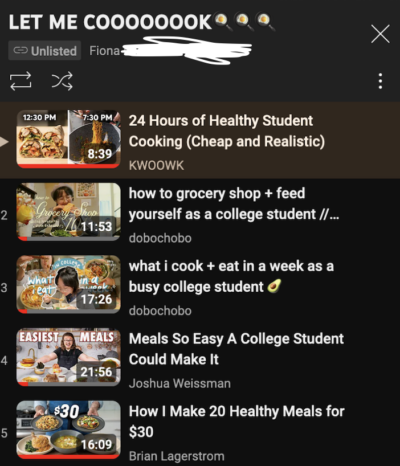
LET ME COOOOOOOK 🍳🍳🍳 by Fiona L. '27
I am stupidly excited about learning this Basic Life Skill, and not ashamed to admit it.
“On a scale from one to ten, where one is ‘Eat to Live,’ and ten is ‘Live to Eat,’ where would you rate yourself?”
The question was asked at a fancy restaurant in Republic Square, Yerevan, after I and some other MISTI01 A program that sends MIT students to work/teach/study in other countries. interns had returned from an excursion to Dilijan, a neighboring city in Armenia.
I thought about how I would rate myself. I had grown up in a family of people who loved to eat. Whenever I went out with friends, I would always want to do something food related. I saw these hangouts not just as an opportunity to spend time with my friends, but also as a chance to get poke bowls at the mall, try out a new restaurant downtown, or indulge in desserts. I’m easily tempted with cake and bribed with chips or candy. Sometimes, during particularly stressful or loathsome days, my meals were the main thing I looked forward to. In fact, in the past overeating was a problem for me: sometimes I’d have a particularly good meal and then experience an “ohmygodimgonnagetatummyachetomorrowwhydididothat” kind of thing.

(Even as I’m writing this blog post, I’m eating a particularly tasty bowl of pho.)
“I’d probably be a nine,” I replied. “Or maybe a ten.”
With all this in mind, it’s a surprise that I never learned how to cook. My parents were never that big on cooking: I remember my high school meals being comprised of microwaved food and Chinese takeout. My mom and dad both worked demanding jobs, and didn’t have time to cook for my brother and I. Apart from one summer where I mastered only a single simple dish–the glorious sunny side up egg–I also didn’t find time to learn how to cook. Most of my time was spent on school, extracurriculars, and preparing for the impending reality of college decisions02 Oh, how I hate to remember those days. .
Still, I don’t want to seem like I’m ungrateful for my parents. Speaking from a college student’s perspective, I really, really miss being able to sit down at the dinner table with my family03 And part of me wishes I had taken more advantage of that time. I’m just starting to realize that, after the halcyon days of childhood, adults will probably never spend that much continuous time with their family ever again. . All the time that my parents spent working was time they sacrificed to keep me and my brother fed and comfortable.
Unfortunately, I didn’t make any progress on my cooking last year either. I spent my freshman year at Simmons, where I relied on the mandatory meal plan for food, and, not wanting to waste money, I used up all 225 of my meal swipes during my freshman fall04 Although things got a bit difficult during spring semester, both mentally and schedule-wise, and I couldn’t finish all my meal swipes. I had around 30 left ;-; . I found that I didn’t get what I wanted out of the meal plan. Not only was it expensive, I didn’t like the food in the dining halls much or the constrained schedules telling me when I could or couldn’t eat05 RIP to my 4pm lunches . To make matters worse, I ate alone in the dining halls more often than I would’ve wanted to. I sometimes couldn’t coordinate meals with my friends because of our conflicting schedules, so if I couldn’t find somebody in the dining hall I knew well enough to eat with, I would sit alone, losing myself in the blue glow of my computer screen.
(Though, I’ve recently come to realize that I shouldn’t let my own social awkwardness get in the way of getting to know people. Asking people to eat lunch/dinner together is a really good ~friendmaking~ tactic I plan to employ more.)
That, combined with Simmons’ lack of floor/wing/suite community06 To Simmons' credit, it has a 'social lounge' system that let residents have more freedom with who they spent time with and what they spent money on. However, as somebody who came into MIT with very few pre-established relationships, I felt like it wasn't the best system for me. , drove me to switch into MacGregor07 A cook for yourself dorm with no mandatory meal plan. We have the reputation of being antisocial, which... is partially true? However, I've been able to find a really welcoming and social entry community here :) at the end of my freshman year. I felt that if I wanted to thrive in MacGregor, I would need to learn how to cook. My mom doubted my abilities to do so, offering me a meal plan and Doordash/UberEats money. However, she only strengthened my resolve. I wanted to prove her–and my own doubts–wrong, showing her that, yes, I COULD learn how to cook.
First, I had to learn the theory of cooking. It’s my personal opinion that even if you know how to cook a specific recipe, that doesn’t mean you know how to cook08 To give a similar example I learned from ADT last semester: knowing how to do <em>A</em> dance doesn’t mean you know how <em>TO</em> dance. . Just being able to recall and go through the motions of a recipe doesn’t necessarily mean you know how to handle a knife, how and when to season, how to make meat the tenderest it can be. I didn’t know any of these things, so I knew I had a lot to learn.

How I currently feel when I hold a knife
As a freshman, I took advantage of my new freedom and developed an assortment of random hobbies: crochet, embroidery, drawing, etc. Simply searching for helpful tutorials on Youtube was my substitute for private lessons, and a large part of the current foundation of my skills. I figured that I could tackle cooking in a similar way. I searched up videos about cheap cooking, meal prep, and cooking as a college student, then added those videos into a playlist I could binge whenever I wanted to feel hungry.

My cooking playlist! I get so hungry when I watch this, so I think I should only watch it while I’m eating.
The next step is the practice of cooking. I decided I wouldn’t start practicing until I came to MIT, since there was no place to cook in my AirBnb09 It’s common for MISTI students to live in AirBnbs, sometimes funded by their MISTI programs. My AirBnb host is possibly the kindest person ever and sometimes brings me home-cooked Armenian food!!!!! . To make matters a little easier for myself, I signed up for a Hello Fresh subscription after finding a promo code in a Youtuber’s video, with the intent of canceling after the generous first-week discount.
Learning how to cook has gotten me excited, as I mentally plan and envision what I’m going to make next year. Whether it be traditional Chinese mapo tofu to experimental cheese waffles, no dish will be out of my reach as I attempt to become a master chef during the remainder of my MIT career. I love sampling new dishes, new methods of cooking, new ways of adding a unique kick of flavor to my food. I also want to see if I can recreate some of my favorite Armenian and Georgian dishes from this summer– khinkali10 a little like a Georgian dumpling , dolma11 meat and rice wrapped in grape or cabbage leaves , and my beloved lahmajo12 meat and spices on a thin piece of bread . There’s a bakery next to my AirBnb, and I try to peek through the windows from the other side of the street every time I walk back from work. If I see a stack of lahmajo on the bakery counter, I cross the street and buy a lahmajo, sometimes paired with a bottle of spicy tomato juice. Now that the summer is nearing its end, the cashier’s started to remember my face and my order. “One lahmajo?” she asks, before the words can even stumble out of my mouth.
Other than my love of food, I want to learn to cook for the health benefits. This summer, I’ve been trying to health-ify my lifestyle in order to lose the weight I gained during freshman year and get back to a healthier weight. I walk to work, take full advantage of the company gym, and eat in more reasonable portions. I figured that home-cooked meals, with their more reasonable portion size, inclusion of meat and fresh greens, and lack of ultra-processing or artificial flavorings, would help me maintain a healthy weight next semester.
Yet there’s one last reason I want to cook, a reason I can’t bear to ignore. When I was very young, my grandmother still lived in the US with my parents and myself. Before the microwavable meals and the stained Chinese takeout containers, there was fried rice, fragrant meat, and lots and lots of spices. I never knew where my grandma learned to cook, where she went to school, what she did as a career. My Chinese was never good enough to communicate with her, let alone the fact that she spoke the regional dialect of her hometown. But I knew without a doubt that she loved my brother and I. I could taste it in the undertones of flavors in my meals, see it in the hours she hunched over a wok, even as walking became harder and her joints started to ache and ache with age. I still really miss all those days and all those meals. Even though, with the passing years, it all seems to blur together in my memory.
But I have a lot more good memories to make in the future. In the same way I experienced love through home-cooked meals, I want to show my friends I care about them by nourishing them–and making SURE that they enjoy that nourishment. Next semester, you can find me inviting my friends over for dinner-and-movie-nights, asking for constructive criticism on my latest cookie experiment, and trying to rope as many unsuspecting victims potential friends into my culinary endeavors.
I can’t end this post without talking about a central part of my food fixation–spice. There was another way in which my family showed their care through food, although this example is a whole less sentimental and a lot more… unique(?). When I was young, my dad tried to train me to be able to eat spicy food. I would eat rice stained with sriracha, interspersed between scoops of ice cream to ease the flames on my tongue. My dad’s logic was that, if I learned to eat spicy food, I would be able to eat spicy and non-spicy food alike. I’d say it mostly worked out. Even though I can eat both kinds of food now, I ended up strongly preferring spicy food due to my “training.” I’d constantly order the spiciest item on restaurant menus, and reach across tables to add chili sauce to my food. But I suppose this is also a cultural thing: my dad is from Hunan, a province of China known for its dry-and-spicy cuisine. When I went to China in middle school, I discovered that virtually every dish in Hunan, whether it be a main course or a humble appetizer, was spicy. I was in heaven.13 I also gained 10 pounds from that trip alone, so let that speak for itself. . I’m sad that my spice tolerance has decreased because of dining hall food, but I hope that these next few years can fix things back to normal. Cue the mapo tofu, hot pot, zha jiang noodles, and spicy Samyang ramen.
So, here’s to a delicious sophomore year! My hope is that I can feed myself, and all the people I’ve grown to care about here, properly. I’d be overjoyed if others like eating my food, even more so if they could handle the spice I put into my own meals. I also hope that when my mom comes over for Family Weekend, I can show her some of my new skills. I want to see the surprise on her face when she learns that, yes, I actually am cooking for myself. But I also want to see her happiness–when she tastes the hours I spent learning some classic Chinese dishes, when she realizes that I included mushrooms even though I can’t stand the texture because I know they’re her favorite food.
Oh. One last thing.
Let’s pray I don’t burn this place down.
- A program that sends MIT students to work/teach/study in other countries. back to text ↑
- Oh, how I hate to remember those days. back to text ↑
- And part of me wishes I had taken more advantage of that time. I’m just starting to realize that, after the halcyon days of childhood, adults will probably never spend that much continuous time with their family ever again. back to text ↑
- Although things got a bit difficult during spring semester, both mentally and schedule-wise, and I couldn’t finish all my meal swipes. I had around 30 left ;-; back to text ↑
- RIP to my 4pm lunches back to text ↑
- To Simmons' credit, it has a 'social lounge' system that let residents have more freedom with who they spent time with and what they spent money on. However, as somebody who came into MIT with very few pre-established relationships, I felt like it wasn't the best system for me. back to text ↑
- A cook for yourself dorm with no mandatory meal plan. We have the reputation of being antisocial, which... is partially true? However, I've been able to find a really welcoming and social entry community here :) back to text ↑
- To give a similar example I learned from ADT last semester: knowing how to do A dance doesn’t mean you know how TO dance. back to text ↑
- It’s common for MISTI students to live in AirBnbs, sometimes funded by their MISTI programs. My AirBnb host is possibly the kindest person ever and sometimes brings me home-cooked Armenian food!!!!! back to text ↑
- a little like a Georgian dumpling back to text ↑
- meat and rice wrapped in grape or cabbage leaves back to text ↑
- meat and spices on a thin piece of bread back to text ↑
- I also gained 10 pounds from that trip alone, so let that speak for itself. back to text ↑